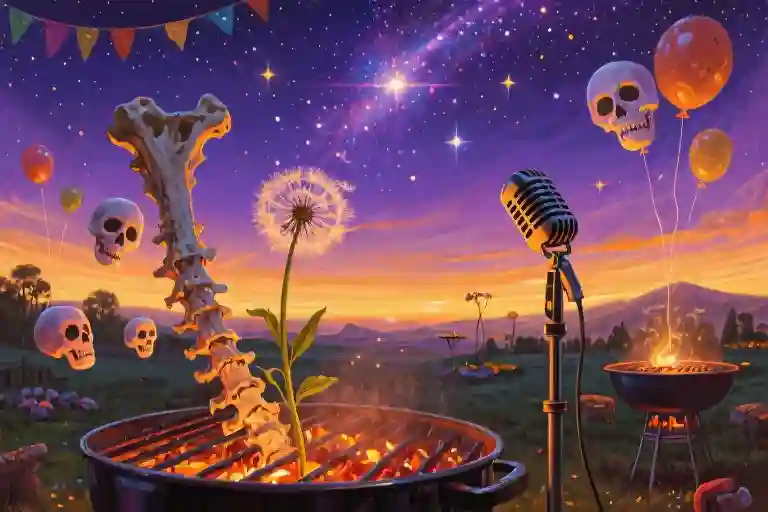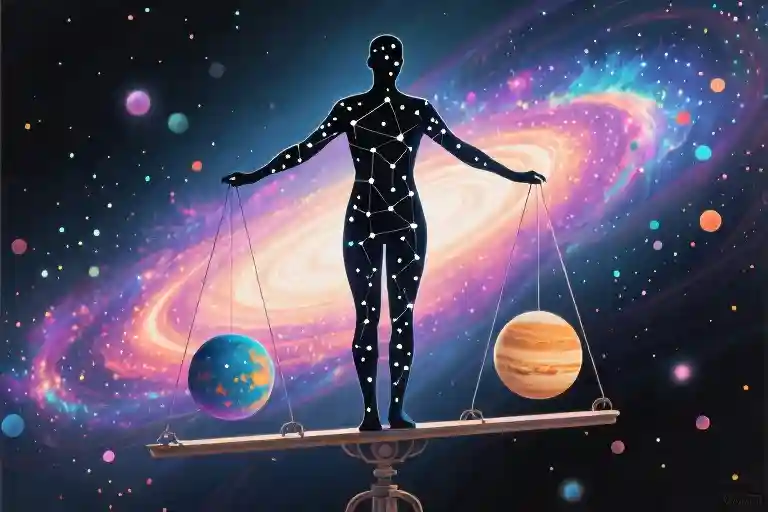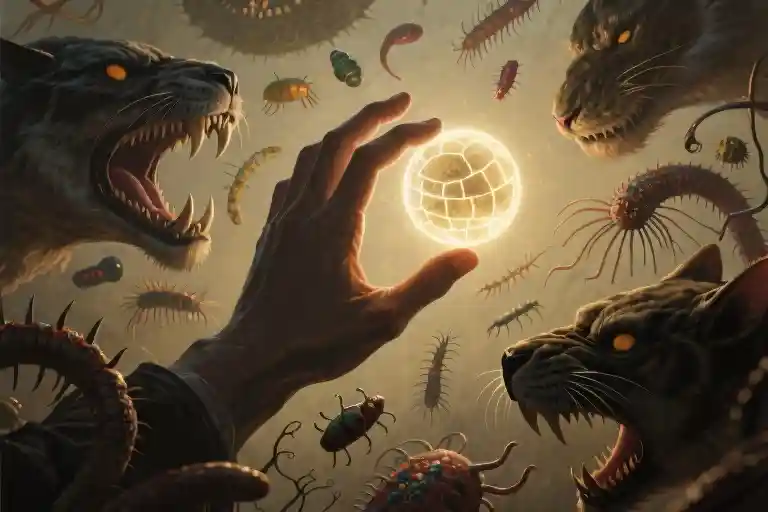Death is the great equalizer – or so we’re told. The one experience every living thing will eventually share, from fruit flies to Fortune 500 CEOs. Scientifically speaking, it’s embarrassingly straightforward: cardiac arrest, cellular breakdown, thermodynamic energy transfer. Your 37.2 trillion cells quietly clocking out like employees at the end of a graveyard shift.
Yet here’s the cosmic joke – our brains stubbornly refuse this clinical explanation. We’ll accept that our carbon atoms might someday fuel a dandelion’s photosynthesis, but can’t shake the suspicion there’s an afterparty we’re not invited to. Maybe one with an open bar and surprisingly good WiFi.
The contradiction defines our relationship with mortality. Physics insists you’ll become approximately 7×10¹⁸ joules of redistributed energy, while your imagination keeps drafting RSVPs to the afterlife’s VIP section. This cognitive dissonance manifests in everything from ancient burial rituals to modern cryonics start-ups – humanity’s collective bargaining with the inevitable.
What makes death uniquely frustrating is its refusal to follow narrative logic. Good stories have payoff moments, but decomposition offers no third-act twist. No post-credits scene where your consciousness gets recruited by interdimensional beings. Just nitrogen cycling and microbial activity – nature’s version of an unsatisfying series finale.
Perhaps that’s why we’ve invented so many alternative scripts. The religious promise of reunion. The quantum physics multiverse theory. The secular hope of living on through art or genetics. Even the darkly comforting idea that we’ll simply return to the same nothingness we experienced before birth. All mental contortions to avoid staring directly at the thermodynamic truth: the universe is running a composting operation, and we’re all future topsoil.
Yet this very refusal to accept death’s banality might be what makes us human. Other species avoid death instinctively – we’re the only ones who build philosophies around it. Our existential panic birthed everything from pyramids to poetry, from life insurance policies to legacy Twitter accounts. The irony? These immortality projects often distract us from living while we still can.
The joke’s on us, really. We spend decades constructing elaborate defenses against oblivion, only to have death shrug and say “Cool story. Anyway…” like a disinterested bouncer. Maybe that’s the real terror – not annihilation, but anticlimax. The growing suspicion that the grand finale might just be… silence.
Or maybe – just maybe – it’s a barbecue where Tupac serves ribs and calls everyone “cousin.” We can’t prove it’s not.
The Science of Death Explained (Spoiler: It’s Anti-Climactic)
Let’s start with the cold, hard facts. When your heart stops pumping, your cells begin their final countdown. Oxygen deprivation triggers a biochemical cascade – first your brain cells surrender after just 5 minutes, then other tissues follow like dominoes over hours. Within days, your once carefully maintained body becomes prime real estate for trillions of microbes throwing what scientists politely call “decomposition.”
Here’s the physics of your final act: that 60kg body contains roughly 280,000 kilocalories of energy. As enzymes break molecular bonds, this energy transforms – about 60% dissipates as heat (enough to warm a small room for hours), while the remaining atoms get recycled into soil nutrients, atmospheric gases, and if you’re lucky, maybe part of a dandelion someday. The carbon that once composed your favorite memories becomes CO2 molecules drifting through oak leaves or coral reefs.
Poetic? Scientifically, yes. The universe wastes nothing – you’re just another temporary arrangement of stardust returning to the cosmic pool. But here’s where our human brains short-circuit: this elegant explanation feels… unsatisfying. After all those late-night existential crises, the grand finale is becoming plant food? Where’s the dramatic climax? Where’s my backstage pass to meet Tupac?
We crave meaning like lungs crave oxygen. The scientific truth – that death is simply the cessation of biological functions – clashes with our storytelling instincts. Maybe that’s why every culture invents afterlives: reincarnation cycles, heavenly pearly gates, even Valhalla’s endless mead halls. Facing the void triggers our imagination’s emergency protocols.
Yet the numbers don’t lie. That carbon cycling follows the same thermodynamics as your backyard barbecue (hence my questionable metaphor). Your bodily energy will dissipate as predictably as heat from charcoal briquettes. The only difference? Charcoal doesn’t spend its existence worrying about becoming charcoal.
So why can’t we accept this? Perhaps because consciousness evolved to avoid death, not comprehend it. Our brains are survival machines, not truth-seeking missiles. When confronted with mortality, they default to denial tactics: spiritual beliefs, legacy-building, or in my case, inventing absurd scenarios about postmortem rib feasts.
The irony? This very resistance proves how alive you are. Only living creatures get existential whiplash from realizing they’re temporary chemical reactions. Rocks don’t write poems about their impending erosion. But you? You’re reading this instead of blissfully decomposing. That cognitive dissonance is your aliveness screaming into the void – and honestly? Kind of beautiful in its own messy way.
If Death Were an Absurd Reality Show
Let’s be honest – if death were a television production, it would be the weirdest reality show ever greenlit. Not the polished, heavily-edited kind, but the chaotic late-night public access variety where the producers gave up on coherence three episodes in. The kind where you’re not entirely sure if the participants are acting or having legitimate existential crises.
Scenario 1: The Eternal Backyard BBQ
Picture the afterlife’s orientation event: an endless barbecue where everyone claims distant relation to Tupac. The smoke never clears because technically, nobody needs oxygen anymore. You shuffle through the crowd making awkward small talk with historical figures while trying to determine if that’s really Shakespeare by the potato salad or just some dude who memorized a few sonnets. The ribs never run out, but neither do the distant cousins you never knew existed. “Oh hey, we’re practically family!” says your great-great-great-great uncle’s neighbor’s dog walker as they help themselves to your plate. The afterlife’s first lesson: everyone’s a little more connected than you thought, and personal space is strictly a living world concept.
Scenario 2: Afterlife Social Media
In this version, the underworld runs on celestial Wi-Fi where your ghostly notifications never stop. Your great-grandmother still comments “thoughts and prayers” on all your posts. Trending topics include #NewGhostProblems and #FirstWeekDead. The algorithm keeps suggesting you reconnect with that childhood friend who died tragically young – awkward. Death doesn’t stop the like farming; people still post carefully curated clouds and harp-playing selfies to maintain their heavenly influencer status. The most controversial platform? HauntTok, where spirits debate whether poltergeist activity counts as engagement baiting.
Scenario 3: God’s Open Mic Night
The supreme being turns out to be a stand-up comic working through some divine daddy issues. The pearly gates open to reveal a smoky underground comedy club where souls become unwilling audience members for eternity. “So a priest, a rabbi, and an atheist walk into a bar…” God begins, for the seven billionth time. The jokes never change, but the punchlines still land because omniscience means perfect comedic timing. Occasionally, a brave soul shouts “heckle from the mortal plane!” but the bouncers – archangels with earpieces and sunglasses at night – swiftly escort them to the special hell of canned laughter tracks.
What these ridiculous scenarios reveal isn’t some profound truth about the afterlife, but rather how human imagination collapses when trying to envision true nothingness. We dress up the void in familiar costumes – family gatherings, social platforms, entertainment venues – because contemplating actual oblivion makes our brains blue-screen. The absurdity isn’t in death itself, but in our desperate attempts to make it make sense using the limited vocabulary of lived experience.
Maybe that’s why we create these mental caricatures: the great cosmic comedy club makes for better cocktail party conversation than “we cease existing.” The barbecue scenario at least gives us something to visualize when the alternative is staring into the existential abyss. And if we’re wrong? Well, at least we went out with a decent punchline.
The Comical Human Struggle Against Death
We’ve all got our little rituals to cheat death. Some are primal, some pretentious, and some so transparent they’d make a ghost blush. Let’s examine humanity’s three favorite coping mechanisms – the holy trinity of existential denial.
Genetic Hail Marys
Having kids is nature’s oldest pyramid scheme. You recruit two new members (your offspring) to carry your genetic code forward, buying your DNA another round in the game. Biologists call this “reproductive fitness.” Parents call it “leaving a legacy.” The child-free call it “passing the existential hot potato.”
Here’s the cosmic joke: your great-great-grandchildren won’t remember your name, just like you can’t name your great-great-grandparents. Yet we keep playing this game of genetic telephone, whispering our biological essence into the future until the message becomes pure noise.
Thought Mummification
Then there’s the intellectual elite’s approach – turning ideas into cultural mummies. Write a book! Compose a symphony! Paint something vaguely phallic that critics will overinterpret for centuries! The logic goes: if your body must decay, at least preserve your thoughts in the aspic of human achievement.
Shakespeare did it. So did Marie Curie. The rest of us try with Medium posts and YouTube rants that get seven views (six from our moms). The uncomfortable truth? Even the pyramids are crumbling. Digital storage decays faster than papyrus. Your carefully curated Spotify playlist will outlast your great novel draft.
Digital Graffiti
Enter stage right: social media, the ultimate “I WAS HERE” carved into the universe’s bathroom stall. We post, we tweet, we update relationship statuses with the fervor of medieval monks illuminating manuscripts – except our manuscripts disappear into algorithmic voids after 48 hours.
That vacation Instagram? Not a memory – it’s a flare gun shot into the void screaming “NOTICE ME BEFORE I DIE!” The LinkedIn humblebrag? A CV for the afterlife. We’ve turned existence into a never-ending open mic night where the audience is already checking their phones.
Here’s the punchline: all three methods share one fatal flaw (pun intended). They assume the universe keeps score. That someone or something cares about our genetic lines, our art, our hot takes. But what if death isn’t just an end, but the ultimate indifference? The cosmic shrug?
Maybe that’s why we invented the afterlife – not as paradise, but as an eternally attentive audience. Up there (or down there), someone’s always watching. Unless… they’re not. And we’re just meat puppets shouting into the void between two oblivions.
Pass the ribs.
Death’s Cultural Punchlines
We’ve all heard the tired cliché about death and taxes being life’s only certainties. But here’s what they don’t tell you – while taxes inspire universal groans, death has spawned some of humanity’s most creative humor across cultures. This isn’t morbid fascination; it’s our species’ peculiar way of giving mortality the middle finger through laughter.
Take Mexico’s Día de los Muertos, where skeletons wear top hats and marigold petals form paths for returning spirits. The candy skulls inscribed with living people’s names aren’t macabre – they’re edible inside jokes. When your great-aunt bites into a sugar skull bearing her own name, she’s participating in what anthropologists call “the laughing cure” for death anxiety. The festival’s entire premise – that departed souls would rather party than haunt – turns Western funeral solemnity on its head.
Cross the Atlantic to Sweden’s annual “Gravestone Humor Competition,” where winners include gems like: “Here lies a man who spent his life waiting for the WiFi to connect.” Nordic countries have elevated tombstone wit to an art form, their gallows humor as crisp as the Arctic air. A Copenhagen cemetery features the epitaph: “I told you I was sick” – proof that some people manage to get the last word even six feet under.
These traditions reveal an uncomfortable truth we rarely acknowledge: our fear of death isn’t about the event itself, but about disappearing without leaving a mark. When New Orleans jazz funerals turn processions into dance parties, or Ghanaian artisans craft personalized fantasy coffins shaped like airplanes and chili peppers, they’re asserting the same thing – that how we frame death matters more than death itself.
Contemporary culture continues this tradition through memes and dark comedy. The viral “Death as a Karen” meme (“I demand to speak to the manager of the afterlife!”) or Twitter threads about ghostly roommate agreements (“Section 4: No floating through walls during date night”) prove we haven’t lost our taste for mortality jokes. Even the surge in “death positivity” movements and comedy shows about dying reflect our need to take death’s sting out through humor.
Perhaps the ultimate cultural middle finger to mortality appears in Japan’s “ending industries,” where young people now hold “living funerals” to attend their own memorials. Guests write mock obituaries like “She finally beat that Candy Crush level – in heaven.” It’s the logical endpoint of our humor defense mechanism – if you can’t avoid death, at least get to enjoy the roast.
These global traditions share a common thread: they don’t deny death’s reality, but refuse to let it dictate the terms of engagement. Whether through satirical epitaphs or skeleton mariachi bands, we keep finding ways to laugh directly in death’s face – and that might be humanity’s most profound survival mechanism.
The Only Certainty About Death
Perhaps the only thing we can say with absolute certainty about death is this: you’ll never get to have a lively debate about whether it’s interesting or not. That’s the ultimate irony, isn’t it? The one universal human experience we can’t actually compare notes about afterward.
All those elaborate theories – the barbecues with Tupac, the cosmic reunions, the nothingness – remain stubbornly unverified. Even Herman Cain’s posthumous tweets turned out to be just some social media manager hitting schedule. We build these mental models not because we know anything, but precisely because we can’t stand not knowing.
Science gives us cold comfort with its talk of energy transformation and nutrient cycles. Your carbon atoms might become tree bark or someone’s hamburger, but that does exactly nothing to answer whether your consciousness gets to keep watching. Physics says energy can’t be created or destroyed, but no textbook explains where your Spotify playlists go.
So we cope in these very human ways: making babies who’ll carry our eyebrows into future generations, writing books that outlive us by three library renewals, carving our names into things like dogs marking territory. The digital age added new variations – now we can leave behind not just genes and memes, but also embarrassing Facebook posts that surface annually to haunt our descendants.
Different cultures developed their own coping mechanisms. Mexicans throw death a party with sugar skulls and marigolds. Scandinavians write self-deprecating epitaphs: “Here lies Lars. Finally caught up on sleep.” The British queue for it politely. We’re all just improvising responses to the ultimate improv scene – one where we don’t get to hear the audience reaction.
Maybe that’s the joke. The universe’s biggest punchline, with the setup lasting decades and the delivery happening offstage. All we can do is keep guessing, keep creating, keep pretending we’re someone’s cousin at the cosmic barbecue – if only to score an extra rib in this brief, bewildering existence.
Now, if you’ll excuse me, all this talk has made me hungry. I’m going to go grill some ribs – not as existential preparation, just because they taste good. And isn’t that the point? We don’t need death to give life meaning when flavor exists. The perfect medium-rare steak might be the most convincing argument against nihilism ever cooked.





